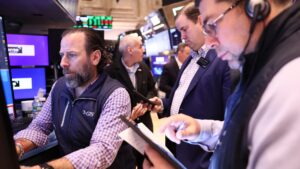Navigating the Current Market Volatility: What Investors Should Know
At Extreme Investor Network, we understand that market fluctuations can create uncertainty and challenge even the most seasoned investors. Recently, insights from Deutsche Bank have underscored the ongoing market sell-off, driven largely by declining consumer and corporate confidence amid tariff uncertainties. As we take a closer look, it’s crucial to unpack what this means for your investment strategy.
The Impact of Tariff Uncertainty
Binky Chadha, the chief strategist at Deutsche Bank, has voiced concerns that the sell-off in U.S. equities is far from over. According to Chadha, the "trade policy uncertainty" is poised to linger, potentially influencing investor positioning until at least early April. This isn’t just another blip on the radar; it’s a reminder that global events can significantly sway market dynamics.
Chadha highlights a potential downside trajectory for the S&P 500, forecasting a drop to 5,250—a stark 6.9% reduction from its recent close at 5,638.94. Such expectations signal the importance of vigilance and proactive adjustments to investment portfolios.
Corporate Earnings Under Pressure
Corporate earnings reports offer a window into the economic landscape, and recent results show that CEOs are taking a defensive stance by cutting capital expenditures and lowering their earnings forecasts. This suggests that businesses are bracing for headwinds, making it imperative for investors to evaluate their current holdings and potential market positions.
At Extreme Investor Network, we emphasize the necessity of staying informed about these trends. Understanding how companies respond to economic pressures can help you make data-driven decisions that align with your investment goals.
The “Trump Put” and Consumer Confidence
One notable aspect of Chadha’s analysis is the notion of the “Trump put,” which refers to the expectation that the current administration may step in to stabilize the market if economic conditions deteriorate. However, Chadha argues that action is unlikely until President Trump’s approval ratings experience a significant decline, perhaps dipping below -5%. This indicates that political dynamics can profoundly affect financial markets, and investors should be prepared for both upward and downward shifts.
A Long-Term Perspective
While the near-term outlook might appear grim, Chadha is steadfast in his long-term projections, maintaining a year-end target of 7,000 for the S&P 500—a bullish stance representing an optimistic 24% gain over the current levels. This perspective encourages investors to consider the potential for rebounds in the latter part of the year, especially if tariff negotiations show signs of resolution.
At Extreme Investor Network, we advocate for a balanced strategy that embraces both caution and opportunity. By analyzing both short-term fluctuations and long-term trends, you can position your portfolio to navigate through volatility effectively.
Conclusion
While we acknowledge the rising risks in the market, maintaining an informed approach is your best defense against uncertainty. As the situation evolves, organizations like Deutsche Bank provide valuable insights that can guide your investment choices. By harnessing this information and considering both current events and long-term trends, you can better navigate the complexities of today’s financial landscape.
Stay tuned to Extreme Investor Network for ongoing market analysis, investment strategies, and insights that can empower you to succeed in your financial journey. Together, we can turn challenges into opportunities and achieve your investment goals.
Feel free to adjust specific statistics or expert opinions, ensuring they align with your brand’s voice and latest data.

